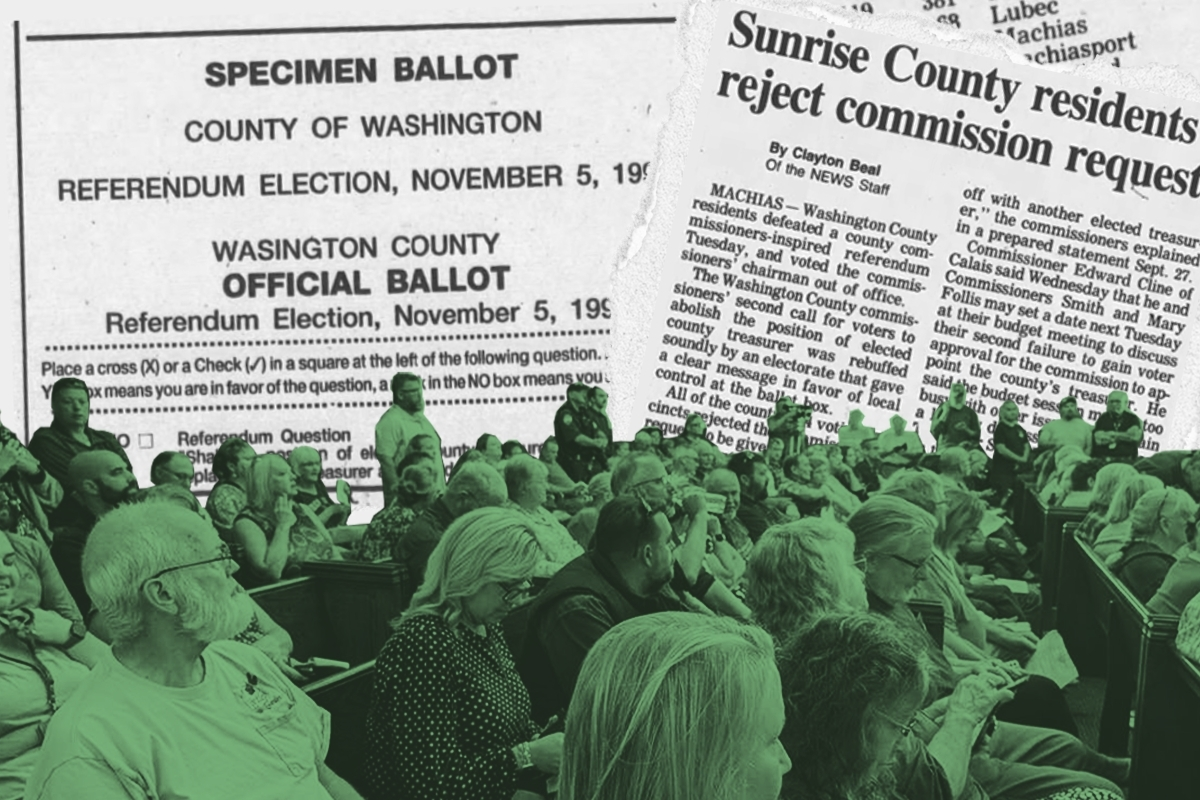
The last time two candidates ran for Washington County treasurer was 1992.
Jill Holmes was the loser. But she got the seat back seven years later, and held onto it for a quarter century. She stepped down this month after presiding over a multiyear budget crisis that is forcing county officials to consider a 40% tax increase and asking voters to approve $11 million in borrowing this November.
Another question may come to Down East ballots soon. Commissioners are discussing a 2026 referendum that would ask voters whether they want to become the fourth Maine county to stop electing the treasurer, an office crucial to managing public funds but one that requires no financial experience and often generates little interest from candidates and the electorate.
“I think the general consensus is that if you’re going to have somebody overseeing financial situations it’s somebody that’s fully equipped to do that, fully prepared,” Commissioner David Burns, a former Republican state senator from Whiting, said.
Election of treasurers dates back to the founding of Maine’s counties. Treasurers are tasked with overseeing their county’s books, directing money to approved expenditures and preparing for audits. At times, it has been viewed as a check on the power of elected commissioners.
But Maine’s weak county governments, which handle sheriff’s offices, deed registries and other services, have long been staffed in uncompetitive elections. Since 2020, only 41% of commissioner races and 28% of sheriff’s elections have had more than one candidate, according to a 2025 report from Democracy Maine.
There is even more apathy around the treasurer role. During the same time period, only two races for county treasurer — 13%— had more than one candidate on the ballot. Going back to 1992, only a third of Maine’s treasurer races were contested. When Holmes won her last four-year term in 2022, thousands of voters left the treasurer line blank.
Holmes first got the job after an appointment from then-Gov. John McKernan filled a vacancy. She was tasked with digging out from poor recordkeeping and a long period of chaos in county government.
The year prior, commissioners frustrated with her predecessors proposed appointing treasurers. In a resounding rejection, 79% of voters opposed the idea that year. A similar referendum failed in 1994, despite a plea from commissioners that looks quaint now.
“In this day of computers and more advanced accounting systems, it is important that the person who is treasurer should have demonstrated expertise in these areas,” then-County Commissioner Mary Follis said ahead of the second referendum on the subject.
While many treasurers, including Holmes, have prior business or accounting experience, it’s not a requirement. In 2018, controversy erupted around a Hancock County treasurer who won election as a write-in candidate despite having no financial experience. It pushed Hancock to consider abolishing the election of treasurers, a change it never made.
Knox became the first Maine county to stop electing treasurers in 2004 via a charter referendum. Charters approved in Cumberland and Androscoggin counties in 2012 also abolished the position. The remaining 13 counties still leave the position open for elections.
The idea of appointing treasurers faced little pushback over a decade ago, Claude Morgan, who chaired the Cumberland charter commission, said. It professionalized the role and removed what he considered a redundancy for counties, which often have finance directors and other qualified staff.
“Conceivably, with that title and a signature, you could do a lot of harm to a county,” he said. “In this day and age, we’ve got [an accountant] down the hallway with a crew of financial wizards. What on earth is a treasurer doing here?”
Next year, Washington County may reckon with this question for the third time after the county’s financial crisis has put the idea back on the table. It was floated at a heated hearing this month, and it has gained some support from area politicians.
Unlike in the 1990s, Washington officials will have the precedent of other Maine counties that have abolished treasurer elections to guide them. Burns added that the creation of a new professional position, such as a chief financial officer, is also a possibility he would support.
“In a small … county setting, you want to have professional people doing certain things like that,” state Rep. Will Tuell, R-East Machias, said.
Daniel O’Connor is a Report for America corps member who covers rural government as part of the partnership between the Bangor Daily News and The Maine Monitor, with additional support from BDN and Monitor readers.



